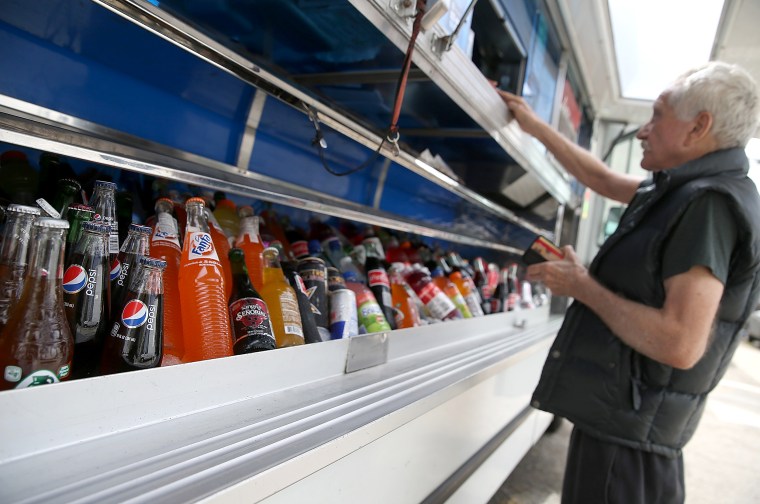When I talk to my personal fitness clients, one of the most common concerns I hear is, I know it’s bad for me, but I just love soda.
Unfortunately, it’s a common refrain: A 2012 study stated that almost half of all Americans drink soda at least once a day, despite knowing that soda “is bad for them.” Soda consumption, besides being a contributing factor to obesity generally, is also linked with increased risk of Type 2 diabetes, heart disease, bone density issues, and — as latest research has shown — Alzheimer’s disease.
It’s not only the adults, either. Research published earlier this year suggests that the prevalence of soda and other sugar-laden foods in the daily diets of infants and toddlers means that that the diseases we associate with adulthood are now becoming more common in the elementary-aged population.
No matter how much we uncover about the risks associated with drinking straight sugar, people are still stuck on the stuff. At some point, it starts to feel like an impossible feat to get people to limit their soda habit.
That’s exactly why many cities across the country are taking a stab at helping their residents kick the habit. Numerous cities — Philadelphia, Boulder, Colo., San Francisco and Seattle among them — have all taken runs at trying to institute a soda tax.
In fact, despite his failed attempt to institute a ban on sugar-sweetened beverages larger than 16 ounces, former New York City Mayor Michael Bloomberg was adamant that it had been the right move. "With so many people contracting diabetes and heart disease, with so many children who are overweight and obese, with so many poor neighborhoods suffering the worst of this epidemic ... it would be irresponsible not to," he said after the attempt was struck down by the Manhattan Supreme Court.
"People are dying every day. This is not a joke."
Soda taxes have certainly been great for bringing in more money to the government, but the open question has always been whether they actually discourage soda consumption.
Research in the September 2018 edition of the American Journal for Clinical Nutrition has suggested that the taxes do, in fact, have a slight chilling effect on the the habit. Scientists analyzed 17 studies intended to explore both sales reports and the buying behavior of the public after a tax was implemented.
The research concluded that the higher the tax, the greater effect on purchasing choices; taxes hovering around 10 percent had the greatest effect.
The thinking behind taxing soda and other sugar-sweetened drinks is that, if we make it harder for the public to afford the product, then perhaps they won’t buy it. Or, alternately, if people are going to insist on buying something consistently shown to be deleterious to one’s health, then the tax revenue should go to strengthening the health care system in that local community.
The problem with this thinking, however, is that it’s myopic. It’s one thing to try to discourage purchasing by passively raising the price, but all that does is penalize the poor in ways that their wealthier peers wouldn’t feel. Taxing soda means that drinking it ultimately boils down to whether or not you can afford to pollute your body with a product linked to chronic illness — something that no one can technically afford to do, no matter what’s in their bank account.
The larger problem is that people simply don’t understand what it means to eat healthily, and that a tax isn’t a nutrition lesson unless it’s partnered with a robust public health campaign that combines research with insight into how to incorporate healthier practices in one’s day to day life.
Despite New York City’s failed attempt to tax the consumption of sugar sweetened drinks, the city still managed to achieve a 35 percent decrease in adult consumption, and 27 percent for high schoolers primarily because, alongside the attempt to institute the tax, the city’s Department of Health and Mental Health crafted a masterful campaign intended to educate the public on the harmful effects of overconsumption. Simply pinning a tax on a singular harmful item isn’t enough to encourage healthier habits, especially when people might harbor an unhealthy attachment to the item in question.
And, it’s not enough to simply assess whether or not taxation has had an impact on soda purchases: We also need to understand if there was a jump in purchases in other sugary products, too, which most research doesn't look at. Making soda more expensive may mean that people who love sugary indulgences will simply bypass the newly-taxed soda for something equally sweet, and far cheaper. In this current food landscape, that’s not a difficult task at all, but both can have an equally deleterious impact on public health.
The reality is that many of us have an unhealthy relationship with sugary foods and, without proper insight and guidance, we pass that relationship down to our children. While it’s definitely not enough to tax one dominant source of sugar and ignore the presence of all the others — there are entire aisles the grocery store that would need to come under fire — it is important that we make healthier options more accessible, affordable and realistic.
If the goal is to truly make a difference in the lives of everyday people, we have to focus on talking to them where they are. Taxation might be successful at reducing consumption to a point, but the greatest impact will always come from helping people understand why they need to break the habit. Use one to fund the other, and you can leave an impression on people that influences public health for good for a lifetime.




